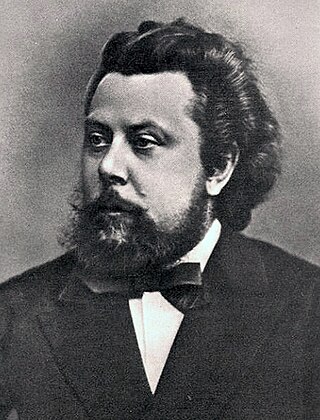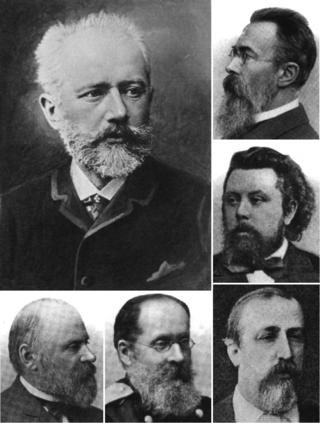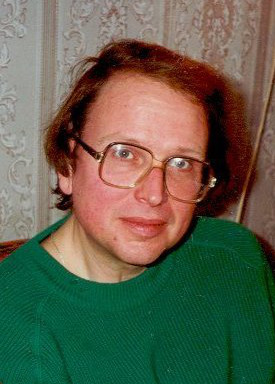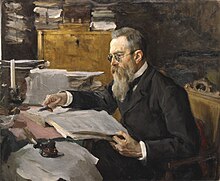
Modest Petrovich Mussorgsky was a Russian composer, one of the group known as "The Five". He was an innovator of Russian music in the Romantic period. He strove to achieve a uniquely Russian musical identity, often in deliberate defiance of the established conventions of Western music.

Nikolai Andreyevich Rimsky-Korsakov was a Russian composer, a member of the group of composers known as The Five. He was a master of orchestration. His best-known orchestral compositions—Capriccio Espagnol, the Russian Easter Festival Overture, and the symphonic suite Scheherazade—are staples of the classical music repertoire, along with suites and excerpts from some of his 15 operas. Scheherazade is an example of his frequent use of fairy-tale and folk subjects.

The Five, also known as the Mighty Handful or The Mighty Five, were five prominent 19th-century Russian composers who worked together to create a distinct national style of classical music: Mily Balakirev, César Cui, Modest Mussorgsky, Nikolai Rimsky-Korsakov and Alexander Borodin. They lived in Saint Petersburg and collaborated from 1856 to 1870.

Mily Alexeyevich Balakirev was a Russian composer, pianist, and conductor known today primarily for his work promoting musical nationalism and his encouragement of more famous Russian composers, notably Pyotr Ilyich Tchaikovsky. He began his career as a pivotal figure, extending the fusion of traditional folk music and experimental classical music practices begun by composer Mikhail Glinka. In the process, Balakirev developed musical patterns that could express overt nationalistic feeling. After a nervous breakdown and consequent sabbatical, he returned to classical music but did not wield the same level of influence as before.

Aram Ilyich Khachaturian was a Soviet Armenian composer and conductor. He is considered one of the leading Soviet composers.

Music of Russia denotes music produced from Russia and/or by Russians. Russia is a large and culturally diverse country, with many ethnic groups, each with their own locally developed music. Russian music also includes significant contributions from ethnic minorities, who populated the Russian Empire, the Soviet Union and modern-day Russia. Russian music went through a long history, beginning with ritual folk songs and the sacred music of the Russian Orthodox Church. The 19th century saw the rise of highly acclaimed Russian classical music, and in the 20th century major contributions by various composers such as Igor Stravinsky as well as Soviet composers, while the modern styles of Russian popular music developed, including Russian rock, Russian hip hop and Russian pop.
The Song of the Forests, Op. 81, is an oratorio by Dmitri Shostakovich composed in the summer of 1949. It was written to celebrate the forestation of the Russian steppes following the end of World War II. The composition was essentially made to please Joseph Stalin and the oratorio is notorious for lines praising him as the "great gardener", although performances after Stalin's death have normally omitted them. Premiered by the Leningrad Philharmonic under Yevgeny Mravinsky on 15 November 1949, the work was well received by the government, earning the composer a Stalin Prize the following year.

Nikolai Yakovlevich Myaskovsky, was a Russian and Soviet composer. He is sometimes referred to as the "Father of the Soviet Symphony". Myaskovsky was awarded the Stalin Prize five times.
Russian opera is the art of opera in Russia. Operas by composers of Russian origin, written or staged outside of Russia, also belong to this category, as well as the operas of foreign composers written or intended for the Russian scene. These are not only Russian-language operas. There are examples of Russian operas written in French, English, Italian, Latin, Ancient Greek, Japanese, or the multitude of languages of the nationalities that were part of the Empire and the Soviet Union.

The music of the Soviet Union varied in many genres and epochs. The majority of it was considered to be part of the Russian culture, but other national cultures from the Republics of the Soviet Union made significant contributions as well. The Soviet state supported musical institutions, but also carried out content censorship. According to Lenin, "Every artist, everyone who considers himself an artist, has the right to create freely according to his ideal, independently of everything. However, we are communists and we must not stand with folded hands and let chaos develop as it pleases. We must systemically guide this process and form its result."
The Symphony No. 2 in C minor, Op. 17 by Pyotr Ilyich Tchaikovsky was composed in 1872. One of Tchaikovsky's joyful compositions, it was successful right from its premiere and also won the favor of the group of nationalistic Russian composers known as "The Five", led by Mily Balakirev. Because Tchaikovsky used three Ukrainian folk songs to great effect in this symphony, it was nicknamed the "Little Russian" by Nikolay Kashkin, a friend of the composer as well as a well-known musical critic in Moscow. Ukraine was at that time frequently called "Little Russia".

In mid- to late-19th-century Russia, Pyotr Ilyich Tchaikovsky and a group of composers known as The Five had differing opinions as to whether Russian classical music should be composed following Western or native practices. Tchaikovsky wanted to write professional compositions of such quality that they would stand up to Western scrutiny and thus transcend national barriers, yet remain distinctively Russian in melody, rhythm and other compositional characteristics. The Five, made up of composers Mily Balakirev, Alexander Borodin, César Cui, Modest Mussorgsky, and Nikolai Rimsky-Korsakov, sought to produce a specifically Russian kind of art music, rather than one that imitated older European music or relied on European-style conservatory training. While Tchaikovsky himself used folk songs in some of his works, for the most part he tried to follow Western practices of composition, especially in terms of tonality and tonal progression. Also, unlike Tchaikovsky, none of The Five were academically trained in composition; in fact, their leader, Balakirev, considered academicism a threat to musical imagination. Along with critic Vladimir Stasov, who supported The Five, Balakirev attacked relentlessly both the Saint Petersburg Conservatory, from which Tchaikovsky had graduated, and its founder Anton Rubinstein, orally and in print.
Mukola Dyletsky was a Ukrainian music theorist and composer born in the Kiev Voivodeship of the Polish-Lithuanian Commonwealth. He was widely influential in late 17th-century Eastern Europe with his treatise on musical composition, A Musical Grammar, of which the earliest surviving version dates from 1677. Diletsky's followers included the Russian composer Vasily Titov.
The Belyayev circle was a society of Russian musicians who met in Saint Petersburg, Russia between 1885 and 1908, and whose members included Nikolai Rimsky-Korsakov, Alexander Glazunov, Vladimir Stasov, Anatoly Lyadov, Alexander Ossovsky, Witold Maliszewski, Nikolai Tcherepnin, Nikolay Sokolov, Alexander Winkler among others. The circle was named after Mitrofan Belyayev, a timber merchant and amateur musician who became a music philanthropist and publisher after hearing the music of the teenage Glazunov.
Konstantin Saradzhev was an Armenian conductor and violinist. He was an advocate of new Russian music, and conducted a number of premieres of works by Pyotr Ilyich Tchaikovsky, Modest Mussorgsky, Igor Stravinsky, Sergei Prokofiev, Nikolai Myaskovsky, Dmitri Shostakovich, and Aram Khachaturian. His son Konstantin Konstantinovich Saradzhev was a noted bell ringer and musical theorist.

Pyotr Ilyich Tchaikovsky's relations with the group of composers known as the Belyayev circle, which lasted from 1887 until Tchaikovsky's death in 1893, influenced all of their music and briefly helped shape the next generation of Russian composers. This group was named after timber merchant Mitrofan Belyayev, an amateur musician who became an influential music patron and publisher after he had taken an interest in Alexander Glazunov's work. By 1887, Tchaikovsky was firmly established as one of the leading composers in Russia. A favorite of Tsar Alexander III, he was widely regarded as a national treasure. He was in demand as a guest conductor in Russia and Western Europe, and in 1890 visited the United States in the same capacity. By contrast, the fortunes of the nationalistic group of composers known as The Five, which preceded the Belyayev circle, had waned, and the group had long since dispersed; of its members, only Nikolai Rimsky-Korsakov remained fully active as a composer. Now a professor of musical composition and orchestration at the Saint Petersburg Conservatory, Rimsky-Korsakov had become a firm believer in the Western-based compositional training that had been once frowned upon by the group.

Alexander Ivashkin, was a Russian cellist, writer, academic and conductor. He was a professor of music and the Chair of Performance Studies at Goldsmiths, University of London since 1999, the director of the Centre for Russian Music, and the curator of the Alfred Schnittke Archive. In 1996, he published the first English-language biography of the composer Alfred Schnittke.
Evgeny Sheyko, a Russian conductor, musical figure was Chief Conductor of Nizhny Novgorod State Academic Opera and Ballet Theatre.

The choral concerto, occasionally known as vocal concerto or church concerto) is a genre of sacred music which arose in the Russian Empire in the middle of the seventeenth century and remained popular into the early nineteenth century. Choral concertos are short compositions for unaccompanied voices, typically containing multiple and distinct sections, with occasional soloistic interludes. The text of the compositions was usually selected from the psalms and other biblical texts, with occasional settings from feast day sequences. Choral concertos were intended for liturgical use; they were sung at the point in the Divine Liturgy when clergy were taking Holy Communion, before the Communion of the faithful.












